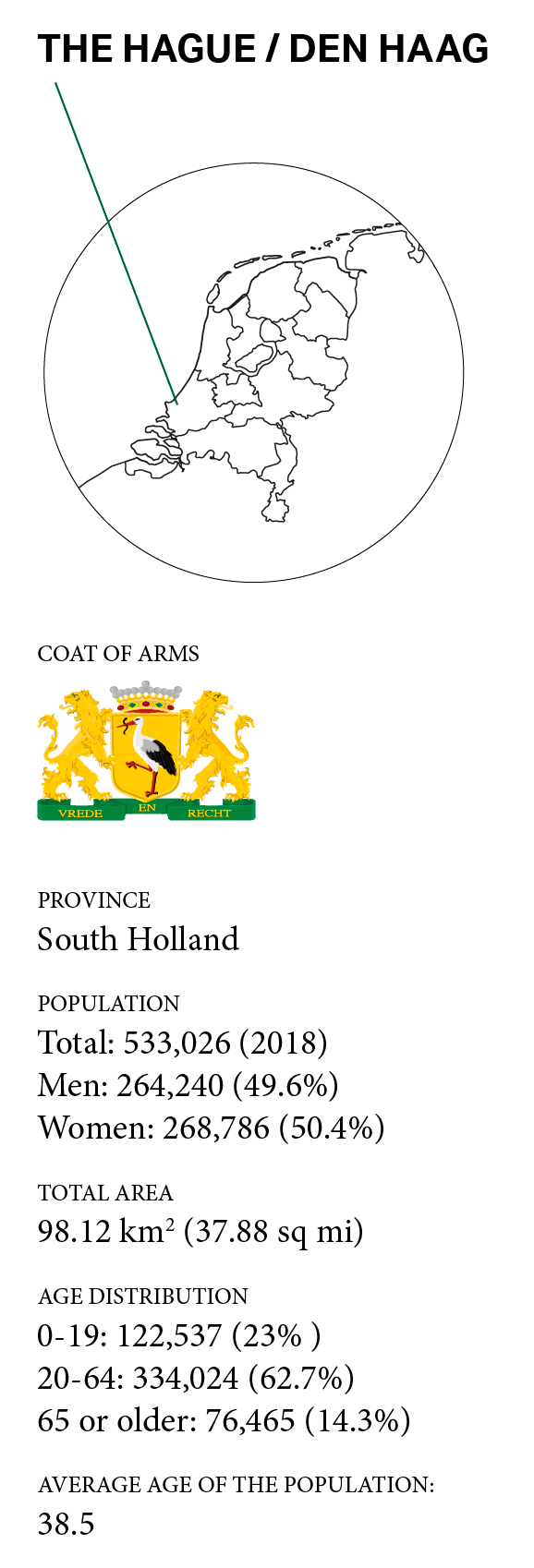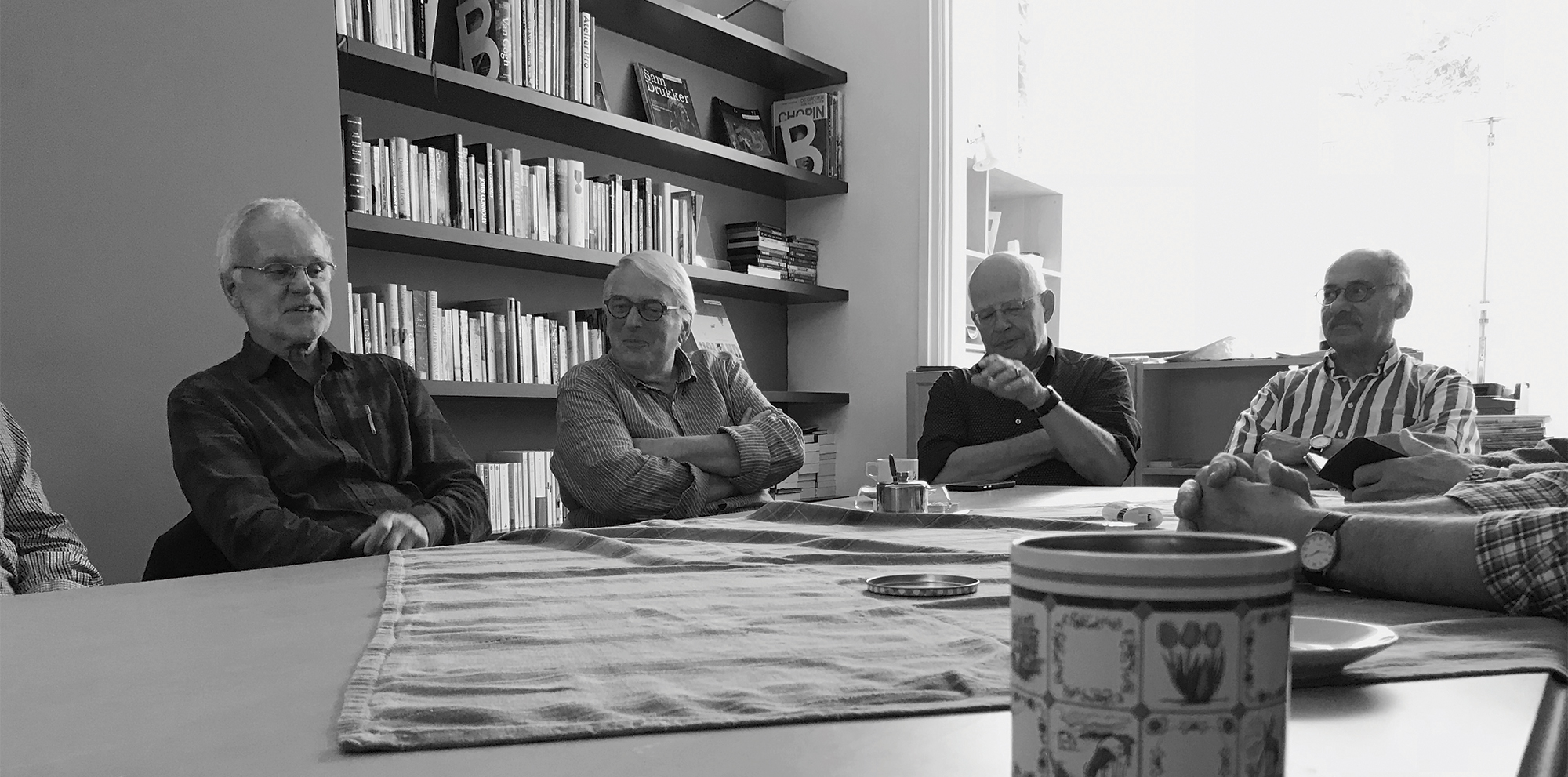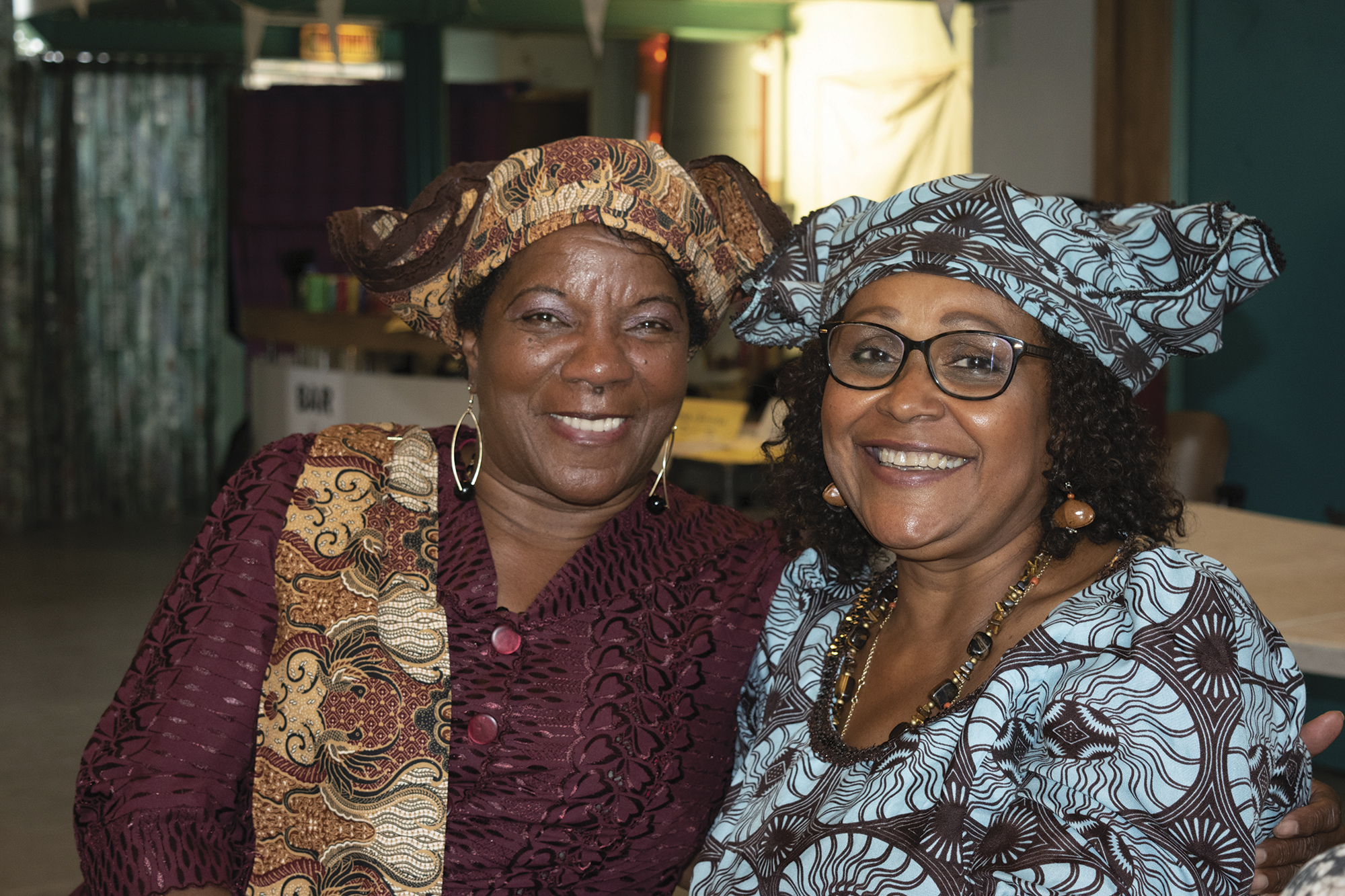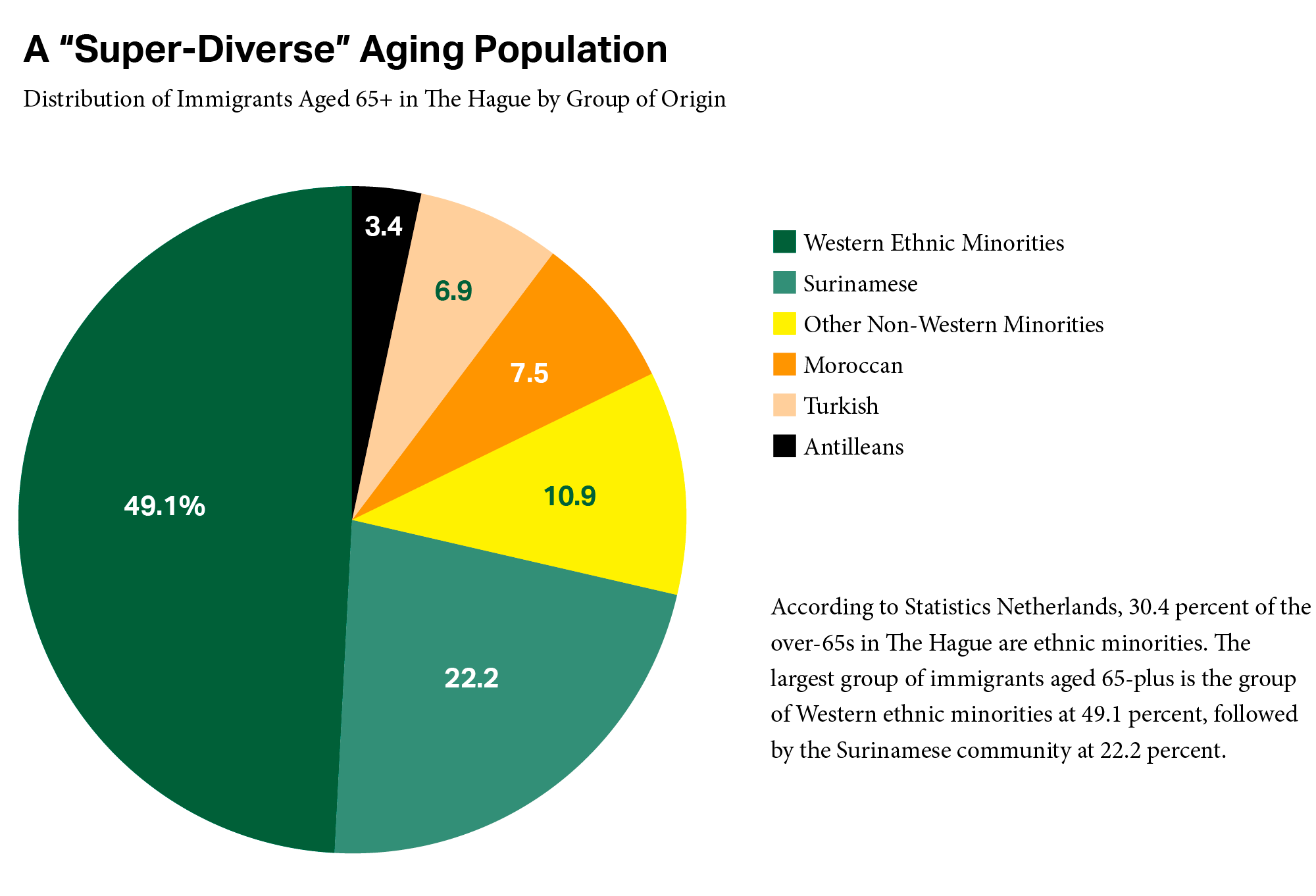- June 07, 2019
- Holly Schulz
Age-Friendly The Hague

Located on the banks of the North Sea, The Hague is the seat of government of the Netherlands and known as an international city of peace and justice. The city is also working toward becoming an age-friendly leader, creating an environment that fosters independence and vitality.
THE HAGUE — On his 75th birthday, Peter Smulders received a call from a local social welfare counselor asking what in other cultures might seem to be nosy questions: What were his activities, and whom did he associate with?
Far from being nosy, though, the birthday call was all part of this city’s plan to engage with the aging population and, more broadly, to shift support for seniors from a welfare model to what the Dutch call a Participation Society.
“In my case,” Smulders recalled about the phone conversation, “there were some weak points, so the counselor recommended I join a discussion group and not be alone.” Smulders was referred to the Herensoos group of retired gentlemen. Since that day, he and 11 of his peers have gathered every Tuesday morning to drink coffee, discuss the topic du jour, and check in on the needs and concerns of its members.
Social Connection
At a recent Herensoos meeting, Smulders and the rest of the group have started proposing topics for their weekly discussions. Members write down ideas on a note card and then the group leader makes a selection. “This morning we started with ‘what is the soul of the human being?” says Fred Kooiman. In the past, the group has discussed migration, integration, organ donation, US President Donald Trump, fake news, and Indonesia after World War II, to name a few topics. Oh, and French wine. The topics are not always heavy.
Of course, life has a way of inserting itself into the life of the group. One club member recently suffered a stroke; according to Smulders, this made a big impression on the group. For several days, the Herensoos lost touch with him. They were finally reconnected, but the experience spurred them to update their contact list. For several members, the Herensoos has become their main support system.
Kooiman, who has taken the lead as chair of the men’s group (and fondly referred to as “The President”) sets the record straight: “We are not caretakers. We are not, say, cleaning or changing nappies and that sort, but if there is a problem, [a group member] can put it on the table, and we start the discussion: how can we assist him to solve his problem?”
In this way, the Herensoos is much more than a weekly men’s group. It is a very Dutch, practical response to the aging challenge — an opportunity for older adults to participate in the community, form a network, and in turn, help others. This human-centered approach is the underpinning of The Hague’s age-friendly city programme.

Meeting of the Herensoos, with Fred Kooijman, left, and Peter Smulders, second from left.
Age-Friendly Programme
In 2015, The Hague became the first Dutch city to join the World Health Organization (WHO) Global Network for Age-friendly Cities and Communities. The city’s plan focused on helping seniors engage among themselves to improve their vitality, reduce loneliness, and encourage participation.
It is not surprising that implementation of these priorities is where Dutch pragmatism shines. Instead of top-down approaches, the municipality of The Hague serves as facilitator to motivate organizations and seniors themselves to take responsibility for their lives. This sustainable model reflects the nation’s steady shift away from government financial support to deal with the aging of the Netherlands, where, as of 2018, 19 percent of the population is already age 65 and older, and this percentage is expected to grow to nearly 28 percent by 2050.
The shift in the government’s role in aging formally began on Prince’s Day ‘Prinsjesdag’ in 2013. The ceremonial opening of the Parliamentary year began, as always, with a speech the Dutch king delivers on the third Tuesday in September to discuss the government’s plans for the year. The nationally televised address that year from King Willem-Alexander delivered a stark, historic message that the welfare state of the 20th century was being replaced.
For those who live in this historic city, the trend toward helping seniors help themselves accelerated in 2015, when the municipality of The Hague began implementing its Action Programme within the WHO’s eight domains of city life.
With regard to the support for older citizens, the traditional focus within the municipal leadership was on care and loneliness — and carried a rather sad, negative view of aging. But through The Hague’s age-friendly program, the focus has shifted to respect and vitality — a much more positive mindset and approach. Policy Advisor for Elderly Issues Elizabeth de Vries explains the important theory of vitality: “Most of the time, as you age, you become more vulnerable. That just happens and there are services for that…But it is much more important to look at how to become vital and not become dull and decline…So our approach within the Action Programme, we ask ‘How can we help you stay vital and have a meaningful life.’”
The Hague has become a model for other Dutch cities looking to become more age-friendly. For instance, officials from the Dutch capital city of Amsterdam and Roosendaal, a municipality to the south, have visited The Hague to learn about their program and the variety of age-friendly initiatives.
Super Diversity
With 14.3 percent of its population age 65-plus, The Hague does not qualify as “super-aged” but is instead “super-diverse”: 50.8 percent of the population have a non-Dutch origin and an impressive 180 nationalities call The Hague “home.” With such diversity, The Hague takes the lead in multicultural inclusion and programming.
A wealth of community associations and clubs cater to the city’s multicultural senior population. Sewcharan Kisoensingh, 68, who immigrated to The Hague 48 years ago from Suriname, is active in the Surinamese and Indian communities. He is a member of various community groups for seniors, participates in celebratory events like Diwali and Holi, and attends activities like yoga classes and Bollywood movie screenings. “These events reinforce how important it is to understand your culture and to meet people through a social activity,” he explains. “While being integrated into Dutch society, you can still keep those ties to your cultural heritage.”

Two friends and members of YaYa Dande, a Surinamese community association, dress in festive traditional creole clothing called “kotomisi”.
Age-Friendly Initiatives
One of the best-known age-friendly projects in The Hague are the Vitality Awards, developed by Roy Wesenhagen, the founder of D’article Enterprise BV, and his team. This competition invites older citizens to share their ideas on how to improve the city. The winners have come in all shapes and sizes, from a Hip Hop Granny Crew—a group of ladies aged 60-plus who gather weekly to learn hip-hop dance moves—to the ‘Beweegtuin’ exercise garden at the Bronovo Royal Medical Centre.
The HMC Bronovo Beweegtuin, led by Rik van Hooff, opened in April 2016 to help older people remain physically and mentally healthy in an innovative way. With special attention to design (from color scheme to layout), van Hooff developed this “playground for seniors,” featuring exercise apparatus for training muscle strength and endurance and intentionally set in a socially conducive manner.
“We are getting older,” said van Hooff, “and if you sit and stay, eventually you cannot get up from the chair…and at a given moment you’ll have to go to a nursing home. So it is in everyone’s interest to keep moving.” The Beweegtuin project, supported by the municipality and partly financed by the Friends of Bronovo Foundation, is intended for both hospital patients and local residents.
The Hague’s leadership on the age-friendly front continues after the March 2018 election of a new city council and the appointment of a new city executive focusing on age-friendly initiatives. That executive, Kavita Parbhudayal, has since focused on digital innovation, including a program called iZi Geond Lang Thuis (Living a Long and Healthy Life at Home) that tests all sorts of technologies to help seniors thrive in their own homes rather than look toward nursing homes or other off-site models. iZi was named the winner of a World Smart City Award at the Smart City Expo World Congress in Barcelona in November 2018.
Queen Máxima herself visited the iZi experience house, a living lab which features over 90 different social and technological innovations. For instance, low-lying sensors in the walls of the home detect residents who fall. High-tech walkers “dance” with residents to maintain their flexibility. And video screens are used to communicate beyond a phone. The guiding principle of iZi is to allow a community of residents to test technology, share experiences, and identify which solutions should be implemented on a larger scale. Seniors who want to consider joining the program even can spend the night in the experience house to see how it might work in their own homes.
Bea Oedai, 66, lives in an apartment within the same community as the iZi experience house and serves as an iZi ambassador, conducting tours and personally testing the technology. Her favorite feature in the iZi house is a gas range that utilizes sensors to shutoff off the gas flow if left unattended for too long, sounds an alarm if necessary, and can be set-up to alert others via smartphone app. Recently Oedai provided feedback on a robot vacuum cleaner, stating “I sometimes find it hard to vacuum when I have a stiff back or painful legs. It works much better than I expected and it can get into difficult corners. You have to watch it though and sometimes send it in the right direction!”
Back at the Herensoos meeting, Smulders and the rest of the group are making plans for the next gathering. Their enjoyment of being in one another’s presence is obvious. In fact, the Herensoos members gave their group a tag line: “Herensoos — Where you’re never too old to meet new friends.”
The Hague does not qualify as “super-aged” but is instead “super-diverse”: 50.8 percent of the population have a non-Dutch origin and an impressive 180 nationalities call The Hague “home.” With such diversity, The Hague takes the lead in multicultural inclusion and programming.
Kooiman explains that they were all ‘perfect strangers’ before the Welzijn Scheveningen social welfare group brought them together in 2016. With financial support from The Hague, Welzijn Scheveningen is comprised of 540 volunteer and 45 professional counselors and social workers who provide individual residents in its district with everything from transportation for wheelchair-bound residents and handyman repairs, to an Alzheimer café and support for informal caregivers. Their motto is “Know each other, help each other.”
Jessy-June van den Breul, a senior counselor at Welzijn Scheveningen who encouraged a number of the latest Herensoos members to join, recognizes that the group, with a dozen members, is at capacity. More such groups are needed.
As the clock strikes 2 pm, Kooiman “The President” reminds Smulders and his friends that they will postpone their scheduled philosophical discussion on life the following Tuesday. Other plans will take priority, for Tuesday is Prince’s Day.
“We have a tv screen here, so we are going to watch the ceremony and the speech of our monarch, our king,” Kooiman explains.
Just another sign of active engagement for the city’s active older citizens. And a sign of collective steps forward, representative of the Dutch approach to aging. ◆
The Hague and the Netherlands: A Portrait in Diversity
By Lauren Hassani
The Hague, the third largest city in the Netherlands, is also among its most diverse. As a seat of government and home to more than 200 international organizations, the International Court of Justice, and the International Criminal Court, the city is filled with people from all around the world. its 530,000 inhabitants represent an astounding 180 different nationalities.
Over the past five years, the city’s population has grown steadily, attributable mainly to foreign immigration. According to Statistics Netherlands, the percentage of the city’s inhabitants with an immigrant background in 2017 was 53 percent; by 2023, that number will rise to 57 percent.
The aging population, in particular, is quite diverse, with 30.4 percent of the over-65s in The Hague identifying as ethnic minorities. One of the largest of these groups is from Suriname, a former Dutch colony in South America, followed by groups that immigrated from Morocco and Turkey.

Like The Hague, the Netherlands as a whole has long had a reputation for tolerance and multiculturalism. Over the centuries, this tiny country has served as a haven for many groups, from those fleeing religious persecution to those in search of economic freedom and new opportunities. Following World War II, as the country rebuilt itself, the Dutch government recruited workers from southern Europe, and then later from Turkey and Morocco in the 1960s and early 1970s. Other groups migrated from the territories in the Dutch colonial empire, including the Indonesians in the 1940s and 50s, the Surinamese during the process of decolonialization around 1975, and the Antilleans (from the Netherlands Antilles) in the 1990s and after. Today, net migration in the Netherlands has reached record levels. This is partly due to increased immigration from other EU member states and a rise in asylum seekers from places like Syria and Eritrea.
As the country becomes older across the board, first generation immigrant groups are aging as well; Statistics Netherlands reports that in 2017, people with a migration background accounted for 14 percent of the Dutch senior population and by 2060, they will account for 28 percent. According to recent studies, older immigrants generally have a lower educational level and a lower socio-economic status than seniors of native Dutch ancestry, making them more vulnerable to certain health problems and less able to access the proper services and assistance. The challenge in the coming years will be meeting the needs of this population and addressing growing disparities to help them to age with the same high level of care and quality of life that all Dutch citizens have come to expect. ◆
Diverse Perspectives
Reporting by Roy Wesenhagen
These residents of The Hague are also first-generation immigrants, representing some of the many older voices from this multicultural city.
Gerda de Bruin, 71
Country of Origin: Suriname
Immigrated in: 1987
“It’s important that the city takes a proactive role informing not only seniors of Surinamese descent, but of all backgrounds, as to what kinds of activities and information are available and how to get in touch with the city. Because of various lags in digital education, people aren’t always capable of accessing the right communication tools. The computer literacy rate among seniors is not as high as among younger people.”
Sewcharan Kisoensingh, 68
Country of Origin: Suriname
Immigrated in: 1970
“I’m very active and I don’t feel old. I’m active as a volunteer and participate in community-based activities to help people of any background. I’ve been volunteering for the Red Cross for 28 years. I also volunteer at one of the elderly care homes and for the Zonnebloem Foundation. I really like the Hague because I’ve found my way around here.”
Paulette Grenet, 67
Country of Origin: Vietnam
Immigrated in: 1979
“I am a part of lots of communities and go to all sorts of events. I like people of all nationalities and backgrounds. I’m with the French people sometimes, with the Indonesian people, with the Surinamese people, with the Americans because I speak English. I don’t prefer any one group. I found that’s nice and it brings me lots of riches in this life — and I don’t mean riches with money. It makes me happy and makes me stay alive and feel young.”
Ifna Blijd, 60
Country of Origin: Suriname
Immigrated in: 1974
“AFIMO has a weekly gathering here in the Hague. We have 100 members. I take part in some trips and events through that organization. We travel to locations throughout the country. We have a campfire day and a biking day, things like that. That helps to bring people together.”